January 2, 2025 | 23:07 GMT +7
January 2, 2025 | 23:07 GMT +7
Hotline: 0913.378.918
January 2, 2025 | 23:07 GMT +7
Hotline: 0913.378.918
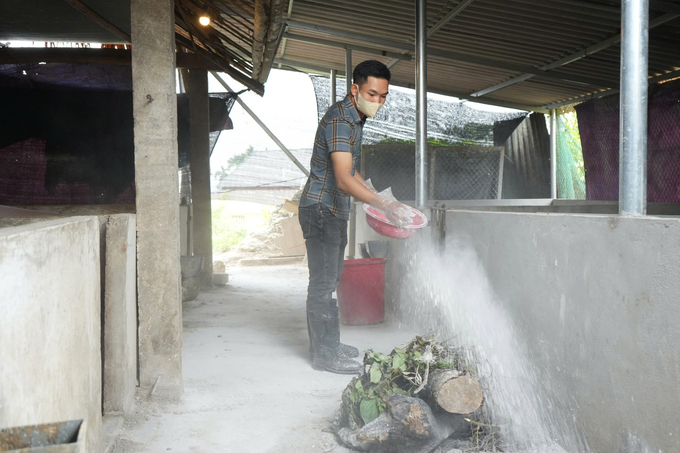
People in Tran Yen district carry out environmental disinfection measures before restocking livestock after suffering from storms and floods. Photo: Thanh Tien.
During the recent natural disaster, the flood rose quickly. Considering his herd of more than 80 pigs, Nguyen Van Quyen (Thinh Binh village, Quy Mong commune, Tran Yen district, Yen Bai province) only had time to move 70 pigs to higher ground, and the remaining 13 pigs were swept away by the flood. After the water receded, the entire family's barn was covered with mud, so the family focused on cleaning the barn to bring the pigs from the hill back to the barn.
When it comes to animal husbandry, disease prevention and hygiene for pigs are the most important things to Quyen. He does everything possible to help the pigs achieve the best growth rate. His family is doing herd restoration right away because they still have 7 sows, and from now until Tet, there will still be pigs to supply the market.
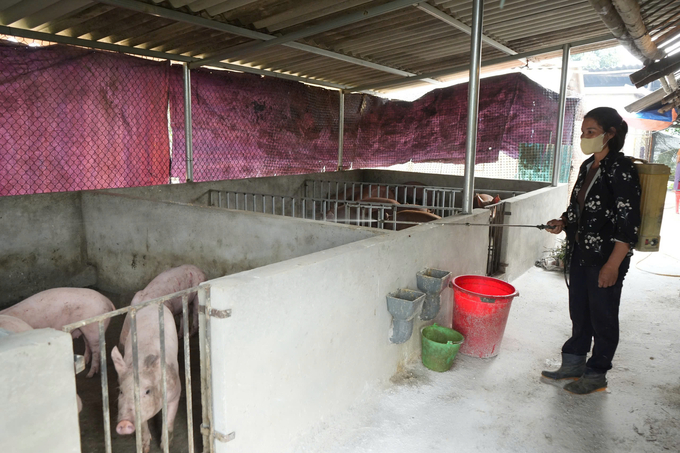
Farmers are advised to periodically spray disinfectants in livestock barns. Photo: Thanh Tien.
Dang Van Thanh's chicken farm in Phu Tho village, Viet Thanh commune is over 600 m2 wide, raising 4,500 chickens per batch. During the recent flood, due to the rapid rise of floodwater, the chicken farm was submerged more than 1 m deep. Almost all the 2-month-old chickens died, only 200 chickens remained because they could fly and perch high.
Immediately after the flood receded, Thanh's family cleared the mud, cleaned the barns and feeding troughs, sprayed disinfectants and sprinkled lime powder around the farm. After the farm was dry and free of disease, he restocked, hoping to make it in time for Tet.
“After the storm subsided, the family made sure to restore the farm’s sanitation, so we disinfected it many times. I re-flocked the chickens, and it has been nearly 20 days now. Overall, the chickens are growing well. My family also vaccinated the chickens thoroughly,” said Thanh.
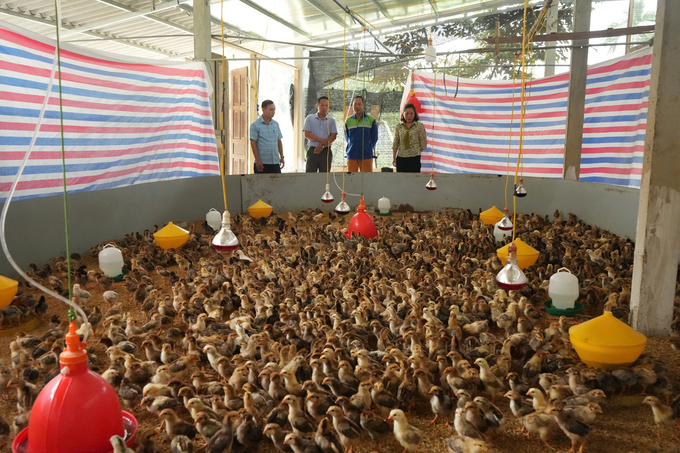
Only when disease prevention conditions are implemented can the herd be restored to avoid losses. Photo: Thanh Tien.
Viet Thanh commune is one of the localities with the largest livestock losses in Tran Yen district. The historic flood caused by Typhoon No. 3 killed over 33,000 livestock and poultry, mainly chickens and pigs.
After the severe storm, the risk of disease outbreaks is very high even in areas that are not flooded. To ensure disease safety for livestock households, Viet Thanh commune has promoted and supported people in terms of spraying disinfectants, sprinkling lime powder on barns in order to ensure disease-free space before restocking. Local veterinary forces recommend that people conduct thorough vaccinations for their livestock during the breeding process.
According to Nguyen Thi Tuyet Nga, Chairwoman of Viet Thanh Commune People's Committee, after the natural disaster, the commune came to encourage affected families and coordinated with specialized agencies to provide livestock households with instructions on farm cleaning and disinfection. The aim is to restore herds as soon as possible, ensuring economic recovery and development in time for the upcoming Lunar New Year.
In Tran Yen district, The number of livestock deaths recorded is more than 220,000 livestock, with some communes suffering heavy losses due to the storm, such as Viet Thanh, Minh Quan, Cuong Thinh, Bao Dap, and Co Phuc town.
Many livestock farming households are in dire straits after the floods, with the risk of a shortage of fresh meat for livestock and poultry during the Lunar New Year. Therefore, the commune-level agricultural sector and localities have urgently carried out the work of overcoming the consequences, restoring livestock production environment, and providing other types of assistance to the affected households.
“The unit has assigned staff to go directly to the grassroots to guide people to destroy the bodies of animals that died due to storms and floods. They have instructed people to clean their barns and prepare the necessary conditions to soon restore the herd,” said Hoang Thi Anh Tuyet, Deputy Director of the Center for Support Services and Rural Development of Tran Yen district.
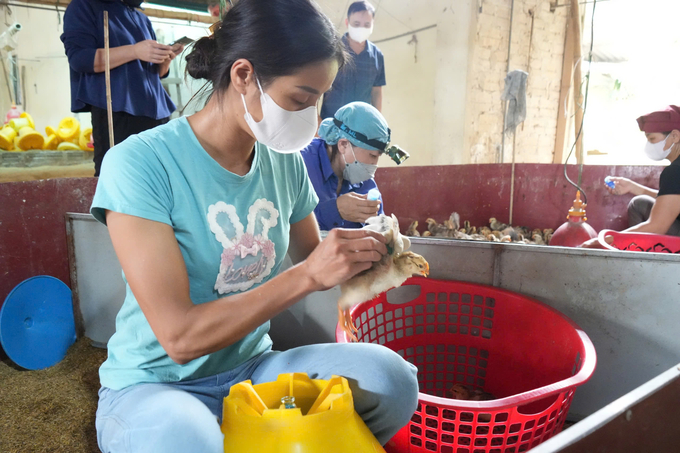
Fully vaccinating livestock is the most effective solution to avoid further damage. Photo: Thanh Tien.
Farmers need to choose breeds with clear origins and high quality, provided by reputable suppliers with quarantine certificates. During the breeding process, strictly follow the vaccination of all types of vaccines. Early herd restoration will help farmers stabilize income and promptly supply products during Tet and the festive season. However, to avoid double losses from natural disasters and disease outbreaks, local authorities need to closely guide people on effective prevention measures.
Translated by Samuel Pham

(VAN) The Vietnamese trade counselor in the United States predicts a positive outlook for this market in early 2025 and recommends several solutions.

(VAN) China has approved five gene-edited crop varieties and 12 types of genetically modified (GM) soybean, corn and cotton, expanding approvals to boost high-yield crops, reduce import reliance, and ensure food security.

(VAN) The French Ambassador to Vietnam discussed the necessity of enhancing bilateral and multilateral collaboration to address climate change, particularly in the agricultural sector.

(VAN) On December 30, MARD and the International Livestock Research Institute (ILRI) held a consultation meeting to review the results of the CGIAR One Health Initiative as part of its project completion process.
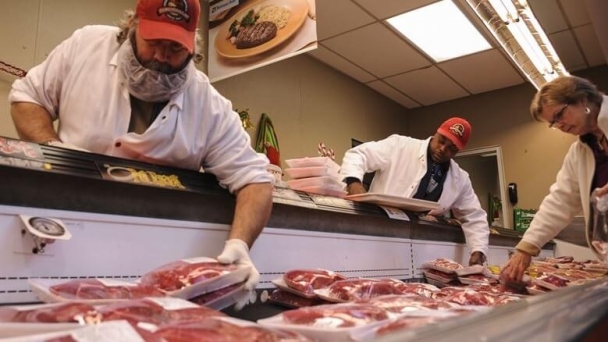
(VAN) The Asian country, the world’s largest beef buyer, will decide if a surge in shipments from overseas has hurt the domestic industry, the Ministry of Commerce said Friday.
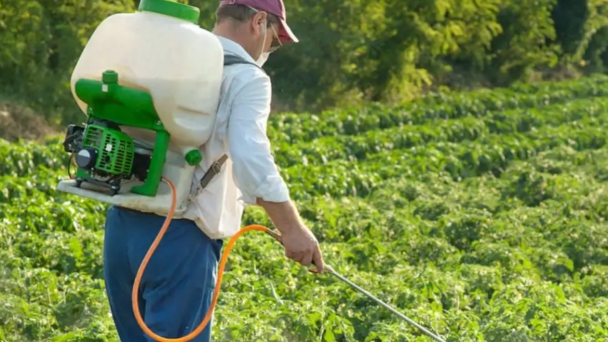
(VAN) The findings show that more extensive research on how pesticides impact the development and severity of various cancers is needed.
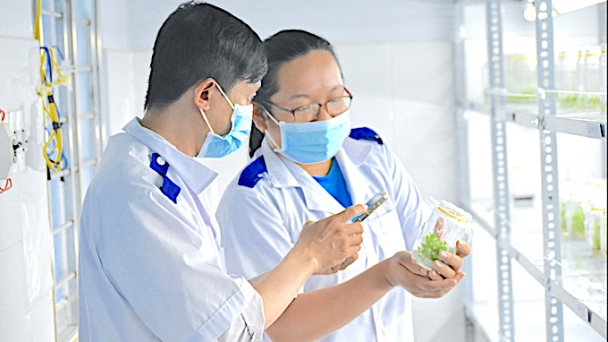
(VAN) The Ministry of Agriculture and Rural Development invests in a digital transformation research project for sustainable agriculture and climate change adaptation in the Mekong Delta.